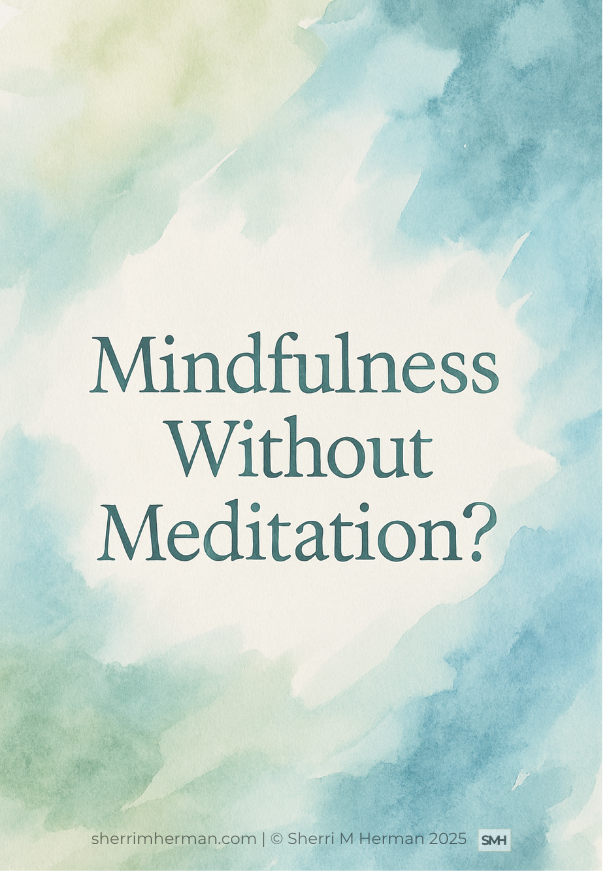Can you practice mindfulness without meditation?
- Sherri M. Herman

- Jul 1, 2025
- 3 min read
Updated: Jul 2, 2025
Have you ever wondered if it’s possible to experience the powerful benefits of mindfulness without ever meditating?

Mindfulness Without Meditation? Yes.
Ellen Langer is a Harvard psychologist who has been studying mindfulness for 50 years and I have been loving her latest book, The Mindful Body: Thinking Our Way to Chronic Health. What’s interesting is that her approach doesn’t include meditation at all (very different from my 10 years of Zen Buddhist training!). She teaches mindfulness without meditation. Yes, you can be more mindful without a formal practice of meditation or yoga. It simply takes the intention to do so. Her approach to mindfulness is about moment-to-moment awareness—being present, being curious, and questioning your assumptions as you move through daily life.
The Power of Mind-Body Unity
One of the core ideas she teaches is “mind-body unity.” Not mind-body connection—unity. She doesn’t see the mind and body as two separate systems influencing each other. They are one; a truth that can be found in many spiritual traditions around the world and one that became clear to me when began my mindfulness practices many years ago. What affects the mind affects the body because there is no real separation. This is part of why the mind has such a powerful role in shaping our health, function, and experience of life. It’s not just positive thinking—it’s a physiological reality.

Events Are Neutral—Interpretation Is Everything
Another key point in her work is the idea events themselves are inherently neutral and are neither good nor bad. It’s our interpretation, our values, and our conditioning that give an event its meaning. This means that how we think about something—how we perceive it—determines how we feel about it. And that perception is always available to be re-examined, and that is what Ellen encourages. We’re not stuck with our initial response. In other words, you can change how you feel by changing how you think. It’s not about pretending something didn’t happen—it’s about seeing it differently, with more possibility, nuance, and agency. This is ultimately empowering and can free you from feeling stuck.
Challenging Assumptions, Changing Outcomes
Ellen Langer seems to love asking, “Is that really true?” She lives to challenge commonly held assumptions because the research has pulled back the curtain on so many of them. Which, I myself find challenging because I'm such a know-it-all! But, her view invites my growth. Some of her research has included setting back clocks to explore our perception of time—putting people in an environment that reflects a younger time in their life and seeing the many seemingly miraculous effects that has on them physically and mentally. “Turning back the clock in the body” is her phrase.
The Mind as a Healing Tool
There is so much research that she explores in the book—it’s fascinating and even somewhat entertaining. I’ve long held the belief that we should utilize or capitalize on the placebo effect more often because it’s safe, accessible, and truly demonstrates the power of the mind to heal. Ellen Langer would effectively agree. It’s always a question of how to do it ethically.
Let Your Mind Work for You
The point is—your mind is so much more powerful at shaping your reality and your health than you might imagine. Ellen Langer’s book will show you why. I couldn't help but share this resource with so many of my clients as I've been reading it because it's so relevant to therapy work. And I wanted to share it with you too. I hope you pick it up and learn how you can think your way to chronic health.
👉 Click here to check out the book. If you give it a read, I’d love to hear what stands out to you.
Download this wallpaper for your phone to give you a daily reminder!

Want more support like this?
Join my free newsletter, Points of Connection, and get stories, insights, and practical strategies sent straight to your inbox every Tuesday.
Disclaimer: This blog is intended for informational and inspirational purposes only and is not a substitute for professional mental health care, diagnosis, or treatment. Reading this does not create a therapeutic relationship with Sherri M. Herman. If you are struggling with your mental health, please reach out to a licensed therapist or medical provider in your area.




Comments